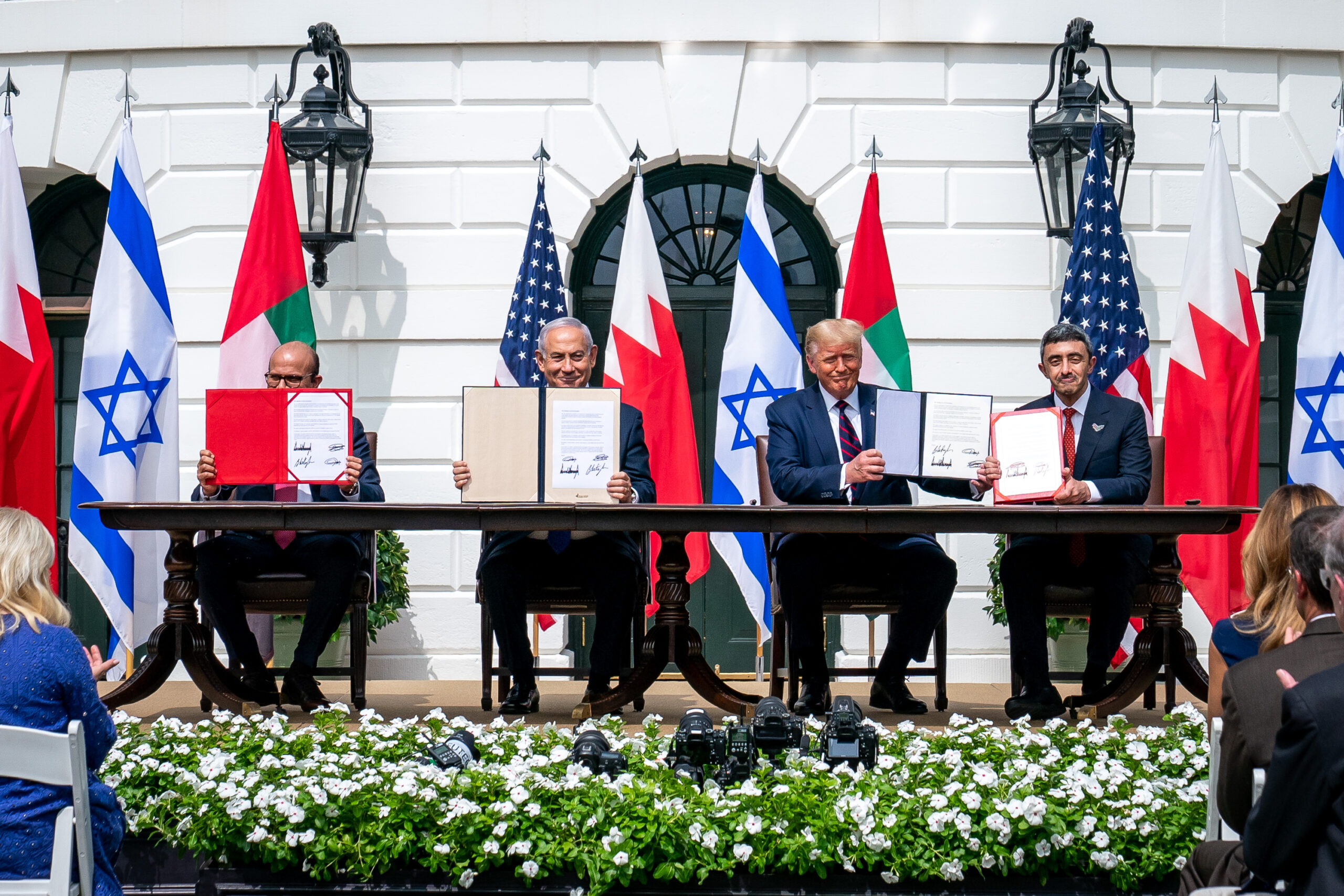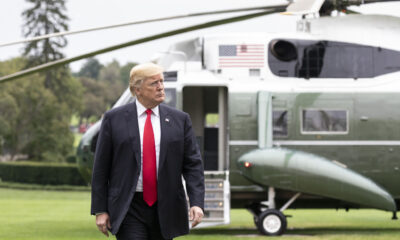Civilization
Strengthening the Abraham Accords: American Foreign Policy Priority
The next administration must strengthen the Abraham Accords to foster peace and prosperity in the Middle East.

Four years ago today (Aug. 13, 2020), President Donald Trump led the initial phone call between the prime minister of Israel and the crown prince of the UAE, launching the Abraham Accords. In the following months, Trump brokered four separate normalization agreements between Israel and Arab countries. In the four years of the Biden-Harris administration, two peace deals have been consummated in the Middle East, one between Saudi Arabia and Iran and the other between Hamas and Fatah – both brokered by China. Today, the Middle East is embroiled in war, with the prospects of a larger more horrific war more likely than calm.
The Abraham Accords led to peace and prosperity
Four years ago, peace and prosperity were spreading over the region, and it can happen again with an “America First” president back in the White House.
Since President Biden took office, the Iranian regime has become increasingly emboldened. While the U.S. was busy freeing Iranian assets and signaling to Tehran that it faced no credible threat, the regime of Ayatollah Khamenei deepened its strategic ties with China and Russia and unleashed its terror proxies on Israel. The current threat of a large-scale coordinated assault by Iran and its proxies against the Jewish State, following the thousands of terror attacks by Iran and its network since October 7, represents a new low in America’s deterrence.
America desperately needs a change of strategy in the Middle East. The U.S. must readopt the trailblazing approach of former President Trump, who during his first term in office brokered the historic Abraham Accords peace agreements while deterring Iran. Regardless of whether the Biden administration changes course or continues to radiate weakness, recent events demonstrate why expanding the Abraham Accords should be a central element of an America First foreign policy when President Trump wins a second term.
The importance of the Abraham Accords for an America First foreign policy strategy in the face of grave geostrategic challenges can be summed up in three words: security, trade, and tech.
A new Middle East defense architecture
The Abraham Accords between Israel and four Arab countries created the basis for a U.S.-led Middle East defense architecture. Such a regional security alliance must go beyond ad hoc efforts to defensively shoot down aerial projectiles and evolve into an integrated air, sea, land, and cyber alliance, capable of deterring, and if necessary destroying, terrorist threats. The result would be a regional security architecture that could not only help counter U.S. adversaries and protect U.S. bases in the Middle East, but that would facilitate a shift of U.S. assets to other theaters such as the Asia-Pacific.
The groundwork for such a security architecture was first laid when, following the Abraham Accords, President Trump moved Israel to US CENTCOM’s area of responsibility, enabling joint exercises and exchanges between the U.S., Israel, and Arab states.
The potential for enhanced regional defense coordination was demonstrated on April 13, 2024, when a U.S.-led coalition, which included Jordan and Gulf states, helped shoot down 99% of the Iranian missiles and drones fired at Israel, preventing what would likely have become World War III. With reinvigorated U.S. support, Israel and its Abraham Accords partners will be able to advance their cooperation further, leveraging their respective capabilities to neutralize terrorist threats originating in the Middle East before such threats metastasize and strike the West.
An economic force to be reckoned with
Building a U.S.-aligned coalition of states across the Middle East will also enable the creation of one of the greatest economic forces and trade corridors in history. The region stretching from the Arabian Gulf to Israel’s Mediterranean ports can provide almost unlimited resources, land, and human capital, while linking East and West through a corridor of trade, energy, and communications. This coalition of states brought together by American leadership will provide the United States with a powerful lever against China and its expanding influence.
One example of the game-changing economic and trade potential of U.S.-aligned regional integration is the India-Middle East-Europe (IMEC) Corridor. At the September 2023 G20 Summit, the United States, Saudi Arabia, UAE, India, EU and European states signed a Memorandum of Understanding to advance IMEC, a trade and transportation network that will not only promote prosperity and stability, but will serve as an alternative to China’s Belt and Road Initiative (BRI). The mutual economic growth from deepened regional connectivity and integration will improve lives across the Middle East, which will provide the added benefit of decreasing the flow of migrants from the region to the West.
The technological imperative
American predominance in the global competition against China and its Russian and Iranian allies will also require maintaining a strong technological edge. Israel, the Start-Up Nation, is globally renowned for its cutting-edge innovation. The countries of the Gulf Cooperation Council (GCC) have an impressive track record of executing large-scale, paradigm-shifting projects which combine ambitious vision and advanced technology. Combining U.S., Israeli, and Gulf ingenuity, resources, and human capital will enable technological breakthroughs in critical areas such as AI, cyber-security, and space that can help keep the United States several steps ahead of China. In this context, consideration should be given to expanding U.S.-Israel technological cooperation frameworks to include Abraham Accords partners as well.
It is important to emphasize that China has recognized the importance of the Middle East and has been investing extensively to increase its economic and diplomatic influence in the region. From 2017 to 2022, China-Middle East trade nearly doubled, and in 2020, China replaced the EU as the GCC’s largest trading partner. China has invested hundreds of billions of dollars in Middle Eastern ports, infrastructure, and energy facilities, strengthening regional connectivity as part of the BRI. If the United States does not demonstrate leadership in advancing regional cooperation, the Chinese Communist Party will fill the gap.
Strengthen the Abraham Accords
Economic cooperation in the region under American auspices will play an integral role in “Making America Wealthy Again.” Technology developed by Israel in the midst of yet another existential security challenge will spark lifesaving innovation and breakthroughs for the United States and its partners.
The thousands of Iranian-sponsored terror attacks carried out against U.S. allies and interests demonstrate why reestablishing the momentum of the Abraham Accords must be a top priority for the next administration. Such an approach will advance the goals of an America First foreign policy, help counter Iran and China, deepen regional prosperity, and promote peace through strength.
This article was originally published by RealClearPolitics and made available via RealClearWire.
Aryeh Lightstone is executive director of the Abraham Accords Peace Institute and former special envoy for economic normalization of the Abraham Accords.
-

 Civilization2 days ago
Civilization2 days agoWhy Europe Shouldn’t Be Upset at Trump’s Venezuelan Actions
-

 Accountability5 days ago
Accountability5 days agoWaste of the Day: Principal Bought Lobster with School Funds
-

 Executive3 days ago
Executive3 days agoHow Relaxed COVID-Era Rules Fueled Minnesota’s Biggest Scam
-

 Constitution4 days ago
Constitution4 days agoTrump, Canada, and the Constitutional Problem Beneath the Bridge
-

 Christianity Today2 days ago
Christianity Today2 days agoSurprising Revival: Gen Z Men & Highly Educated Lead Return to Religion
-

 Civilization3 days ago
Civilization3 days agoThe End of Purple States and Competitive Districts
-

 Executive3 days ago
Executive3 days agoWaste of the Day: Can You Hear Me Now?
-

 Executive4 days ago
Executive4 days agoWaste of the Day: States Spent Welfare in “Crazy Ways”











